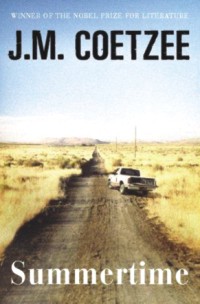Book Review

 |
Summertime
JM Coetzee
266pp, Harvill Secker, £17.99 |
JM Coetzee is often described as reclusive, though elusive might be a better word. He didn't turn up to collect the award either time he won the Booker Prize. When he won the Nobel in 2003, he showed up at the ceremony but instead of giving the customary lecture read a story about Robinson Crusoe. Invited to give the Tanner Lectures at Princeton a few years earlier, he had similarly read a pair of stories - about a fictional novelist, Elizabeth Costello, giving two lectures on animal rights. Many of his novels, too, imply that the best way to explore intractable ethical problems may be in fiction, if only because fiction helps to resist the pretence that there are easy answers to difficult questions, if, indeed, there are any answers at all. Much of his fiction, especially up to and including Disgrace (1999), could be described as anti-allegorical; the stories have the form of allegories, but defy simple allegorical interpretation.
Another strand in Coetzee's work, which has become increasingly prominent over the decade since Disgrace, could be called anti-autobiographical. As well as the books featuring his alter ego, Elizabeth Costello, he has written a trilogy of what his publisher describes as "fictionalised memoir": Boyhood (1997), Youth (2002) and, now,
Summertime.
The first two are relatively conventional narratives, told in the third person and the present tense: "He plays with the vacuum cleaner, tearing up paper and watching the strips fly up the pipe." Summertime begins in the same mode, but is soon interrupted by italicised notes "To be expanded on…"; "To be explored…" and then abruptly gives way to a series of interviews conducted by an English academic, Mr Vincent, who is writing a biography of the late writer JM Coetzee, whose notebooks he has already scoured.
Summertime plays with the question, which Coetzee seems to find genuinely baffling as well as wryly amusing, of why people should be at all interested in him as a human being. Julia, the first interviewee, had a brief affair with Coetzee in the mid-1970s, the period Vincent is concentrating on. She says the novelist was a "cold fish" with "no sexual presence whatever". Adriana, a Brazilian dance teacher whose daughter was taught English by Coetzee, and who Vincent believes may have been the model for the protagonist of Foe (1986), says that "he was nothing, just an irritation, an embarrassment". He was "tepid", "disembodied", like "a man dancing naked, who did not know how to dance". It isn't clear, and probably shouldn't matter, whether or not the interviewees have direct real-life counterparts. If they do, the novelist does at least appear to have changed their names, in some cases more than once; Coetzee's cousin in Boyhood, Agnes, becomes Margot in Summertime.
The novel poses a number of stern ethical questions, such as whether it isn't somehow immoral to be more interested in the life of Coetzee, just because he's a famous writer, than in the life of, say, Mario Nascimento, Adriana's husband, a refugee from Brazil who worked in Cape Town as a security guard at a warehouse until a gang of robbers smashed his face in with an axe. The stories of the other characters in the novel, from Coetzee's father to the interviewees' parents, husbands and children to the interviewees themselves, are all at least as compelling, funny, moving and full of life as Coetzee's own.
Summertime pretends that the interviewees are telling their own stories. But Vincent has recast his interviews with Coetzee's cousin, Margot, as a continuous narrative, "fixed up the prose" and "dramatised it here and there, letting people speak in their own voices". What he is actually doing, of course, is making them all speak in his voice a dizzying pastiche by Coetzee of an imaginary devotee writing a pastiche of him. Margot hasn't consented to this rewriting of her story and frequently interrupts to object to various fanciful elaborations. But then Vincent's voice isn't really his own; he's a fictional character, an invention of JM Coetzee's, like all the characters in the novel, including the young John Coetzee, on whose behalf the novelist purports, perhaps outrageously, to speak.
"It would be very, very naive to conclude that because the theme was present in his writing it had to be present in his life," one of Vincent's interviewees tells him. A novel so flagrantly autobiographical as Summertime appears to test that assumption to its limits. But then again, considering that Coetzee has changed the most basic fact of his life whether he is alive or dead for the purposes of the novel, readers have no grounds for believing that anything else they are told about the character John Coetzee necessarily holds true for his eponymous creator.
Summertime is both an elegant request that the sum of Coetzee's existence as a public figure should be looked for only in his writing, and ample evidence, once again, why that request should be honoured.
-- THOMAS JONES
Copyright
(R) thedailystar.net 2009 |
